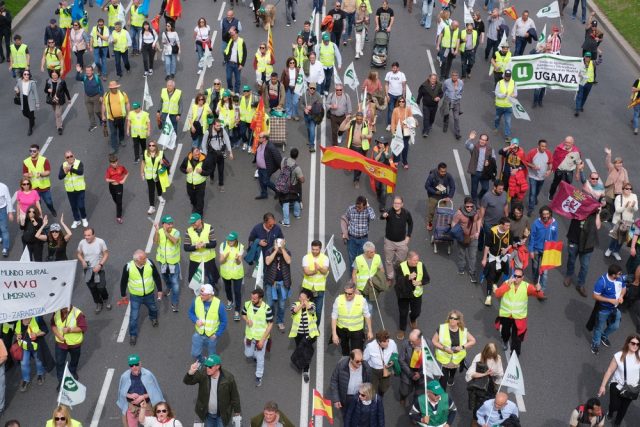
The European Union’s agricultural policies continue to face criticism for failing to address the core demands of the primary sector—namely, making it more competitive, economically viable, and sustainable in the long term. Issues such as trade relations with Morocco, the imposition of eco-schemes, and the ever-growing maze of administrative procedures have been consistent points of contention for European farmers. The recently approved EU-Mercosur trade agreement has now been added to this list of grievances.
France and Poland were the first countries to formally oppose the EU-Mercosur deal, citing concerns about protecting their agrifood sectors. In contrast, Spain, under the leadership of Minister of Agriculture, Fisheries, and Food, Luis Planas, has supported the agreement, arguing that it benefits the economy across all productive sectors. However, Spanish farmers strongly disagree. They have taken to the streets once again, gathering in front of Spain’s Ministry of Agriculture and in other EU countries to voice their discontent. These protests were organised by two of Spain’s most prominent agricultural organisations, Asaja and COAG, both of which advocate for the interests of the primary sector.
Asaja, a leading player within COPA-COGECA—the European agricultural umbrella organisation—has been one of the most vocal critics of the EU-Mercosur agreement. The organisation holds considerable influence in European agricultural decision-making processes, and its president, Pedro Barato, has made it clear that Spanish farmers are not against trade agreements in general. Instead, their opposition is aimed at the specific terms of the EU-Mercosur deal, which they argue will result in “unfair competition” for European farmers.
A key concern for farmers is the disparity in sanitary and phytosanitary standards. Mercosur countries are not required to meet the same stringent regulations that EU producers must comply with. Spanish farmers argue that this regulatory gap puts them at a significant disadvantage. Pedro Barato has stressed that Spanish farmers are more than willing to compete with their Mercosur counterparts, but only if the competition takes place on a level playing field. However, the EU-Mercosur deal does not guarantee such conditions.
COAG, another influential farmers’ organisation, has echoed these concerns. Miguel Padilla, the secretary-general of COAG, expressed surprise and frustration that Spain, a country with a robust agricultural sector, would be one of the main proponents of a deal that seems to undermine its own farmers. Padilla pointed out that EU agricultural regulations are the strictest in the world, placing European producers at a disadvantage compared to farmers from Mercosur countries. He also highlighted the contradiction in Spain’s stance, given that other major agricultural nations like France and Poland have taken a firm position against the agreement.
This discontent is not limited to farmers and sectoral organisations. Prominent political figures from Spain’s autonomous communities have also joined the debate. Isabel Díaz Ayuso, president of the Community of Madrid, was particularly outspoken. In a public statement, she criticised the deal for failing to account for its impact on Spain’s agricultural sector. Díaz Ayuso demanded that imported products from Mercosur be held to the same standards and regulations that European farmers are required to meet, thereby ensuring fair competition. Her comments reflect a growing chorus of voices within Spain calling for a more balanced approach to international trade deals.
The tension between the agricultural sector and policymakers is only intensifying. Farmers argue that trade deals such as the EU-Mercosur agreement are being pushed through without sufficient regard for the impact on local producers. Despite repeated protests and the backing of some political leaders, such as Díaz Ayuso, farmers remain sceptical about the government’s willingness to defend their interests. They fear the deal will jeopardise their livelihoods and the long-term sustainability of Spain’s agricultural sector.
The stakes are high. Farmers have warned that failure to address their demands could lead to further protests and unrest. They have called on both the Spanish and European governments to reconsider the agreement and introduce safeguards that protect the interests of local producers. Farmers are not opposing trade in principle, but they insist that trade agreements must guarantee fair competition, equal regulatory standards, and sustainable conditions for all parties involved.
The broader implications of the EU-Mercosur deal go beyond Spain. Protests have also erupted in other EU countries, highlighting the growing divide between policymakers and the agricultural sector across Europe. Farmers are demanding to be included in decision-making processes that have a direct impact on their survival and growth. The perception that governments prioritise international trade goals over the well-being of their domestic industries is fuelling discontent and weakening trust in policymakers.
Ultimately, the protests by Spanish farmers highlight the need for a reconsideration of the EU-Mercosur deal. They seek a commitment from EU leaders to uphold basic principles of fair competition and to ensure that all producers operate under the same regulatory standards. Without these guarantees, the long-term sustainability of Europe’s agricultural sector could be at risk.
If governments continue to ignore the demands of the farming community, they may face an escalation in protests and social unrest. The EU-Mercosur risks becoming a catalyst for conflict between farmers and policymakers.



 Subscribe
Subscribe